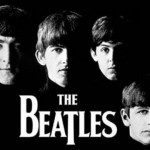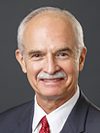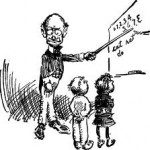Stephen Prothero recently wrote at CNN’s Belief Blog that Christians, like gays, are “coming out” on television. He refers to the popular show Glee, which features a gay couple, a lesbian couple, a transgender singer, and a “God Squad” of Christians whose sole purpose seems to be to provide Glee creator Ryan Murphy a foil against which to make his arguments. Prothero applauds the following conversation, which took place on the show, for showing Christians struggling with their faith and talking about the Bible:
Mercedes (Amber Riley) calculates that since “one out of every ten people are gay . . . one of the twelve apostles might have been gay.” Sam (Chord Overstreet) observes that “the Bible says it’s an abomination for a man to lay with another man,” prompting Quinn (Dianna Agron) go ask, “Do you know what else the Bible says is an abomination? Eating lobster, planting different crops in the same field, giving somebody a proud look. Not an abomination? Slavery. Jesus never said anything about gay people. That’s a fact.”
That it’s a theologically illiterate view of the Bible (the old Shellfish Objection is easily dispensed for anyone who has actually studied both sides of the issue), gives no coherent justification for a traditional Christian viewpoint, and never seriously challenges the prevailing assumptions of the show that homosexuality should be embraced and celebrated, does not bother Prothero because he shares Murphy’s point of view on these issues. Yet, to be honest, if we cannot have the Bible discussed well on television, then I would rather not have it discussed at all. I don’t really want Ryan Murphy teaching teenagers the Bible.

The larger issue this raises, however, is the way in which Christians have been “closeted” on television in the first place. The great majority of Americans are Christian, and yet you would never know it from American television. There are some welcome exceptions. Everybody Loves Raymond and The Middle (which features a hilarious youth pastor character) show their families going to church and sometimes discussing their Christian faith. And on Smash, a gay character convinces his partner to wait on sex and come to church with him — which, although it’s arguably in service to a pro-gay message, is actually a decent plot element, and I certainly want my gay friends to be welcome at churches. Yet the exceptions are few, and even in the exceptional cases one very, very rarely sees an articulate case made for Christian faith or for a traditionally Christian worldview.
This is not a complaint that we are not proportionally represented. If that is so, we need to get in the business and make cultural products of such quality that they simply must be shown on television and on movie screens. So this is not a complaint about the actions of others. It’s just a question: What is the cumulative effect of all this?
The stories we tell each other matter. I wrote my doctoral dissertation on the Danish writer Soren Kierkegaard, and early in his career Kierkegaard engaged with “tragedy” and “irony” not merely as literary/dramatic genres but as modes of life. To take an example from my own childhood, imagine a class of gymnasts sitting on the floor and watching one video after another of an Olympian performing a skill they wished to learn. By watching it done over and over, by entering into the “story” the video told, you are preparing your mind (and really your body as well) to perform the skill. In the same way, Kierkegaard and many of the literary theorists of his day believed, when we watch stories unfolding on the stage or read stories in the pages of our books, we are seeing, and imaginatively entering into, practices and habits, attitudes and ways of being that we will subconsciously absorb.
Think of it this way. The television show Friends showed a group of six men and women living in New York City and, from time to time, confronting serious questions about relationships, marriage, vocation, even death. For those who watched the show: Do you once recall them turning to God with their questions, or even asking any question about God whatsoever? I can recall one episode where Phoebe tried to poke holes in Ross’s confidence in evolution, but that’s about it. Now, expand this out to dozens of television programs, scores, hundreds, where people are facing important, sometimes life-and-death questions, without once asking the ultimate questions about God and afterlife and salvation. Thousands of characters confronting major life decisions, thousands of times, almost entirely without reference to God.
What is the cumulative effect? We often talk about the rise of “nones” and the rise of agnostics and atheists and apatheists (people who don’t know and don’t care), and I wonder if the thousands of hours the average American spends watching television — when television is almost entirely scrubbed of references to God or compelling examples of people of faith — has an effect. I don’t mean to deny other factors, including ones that reflect poorly on Christians themselves. But to deny that this would have an effect is, I believe, to deny the obvious. Are we training ourselves–and training our children–to confront life’s questions without reference to God? When you see a thousand characters confront the question of whom to marry, and not a single one expresses that one should take this question to God, isn’t this sort of putting us through the motions? Won’t we, like those gymnasts, end up mimicking the people whose performance we have watched and enjoyed over the years?
Which brings me to a book that recently arrived in the mail — Dallas and the Spitfire: An Old Car, an Ex-Con, and an Unlikely Friendship. Written primarily by Ted Kluck, it tells the story of a Christian writer working alongside an addict ex-con to fix a car and collectively put their lives together. It’s “Life as a House,” if the house were a car. It’s a story of discipleship, as Ted mentors the young man, and also a story of how God’s grace brings people out of bondage to sin and into a newfound freedom and truth. It’s a quick read, written in a wry style (Kluck seems to have attended the Dave Barry Seminar on Comic Footnotes), with a painfully honest look at how one broken Christian “bro” (this may be the most common term in the book) can pour himself into a younger man in need of help — and, in the process, find healing himself.
Why aren’t stories like these told on television? Rather than having a “Teen Jesus” on Glee to give some faux balance and provide the cue for loaded arguments against traditional Christian viewpoints, why not show a thoroughly traditional (and openly imperfect) Christian like Ted Kluck helping a person put his life back together? These kinds of stories happen all the time — all the time — and yet I honestly cannot recall ever seeing a story like this on any television program made in the last ten years. They don’t have to be saccharine, they don’t have to be hit-you-over-the-head rhetorical; they can just be matter-of-fact. This is what people do. There’s plenty of comedic potential in there — Kluck certainly mines a lot of it. He’s written a couple essays online that irritated me, to be honest, and this is not exactly my style of book. But it shows discipleship and evangelism, being a believer and being the hands and the mouth of Christ, in an honest, searching, nitty-gritty, realistic, funny way. I appreciate that.
What would television look like if it reflected the American people and the things they believe, value and cherish? And how can we expect our children to approach life’s major decisions with reference to God and what God has made known, when they have watched thousands of characters confront those same decisions with entirely different criteria in mind?











